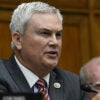The American people didn’t want it and Congress couldn’t do it, but don’t let that stop the Environmental Protection Agency (EPA).
Despite Congress’s inability to pass cap-and-trade legislation that would have increased energy prices dramatically, the EPA is moving forward with its own regulations on greenhouse gas emissions, most notably carbon dioxide (CO2). The EPA will start regulating emissions from new power plants and major expansions of large greenhouse gas emitters and set the schedule for the next two years:
By midyear 2012, refineries and fossil-fuel-fired electric utilities will be required to begin lowering their greenhouse gas emissions under a recent court settlement reached by the Environmental Protection Agency and several states and environmental groups. Refineries and power plants are responsible for 40% of U.S. greenhouse gas emissions, EPA said when making the announcement on Dec. 23.
Under the settlement, EPA will use Clean Air Act regulations to propose emissions standards for power plants in July 2011 and for refineries in December 2011 and to issue final regulations in May and November 2012, respectively.
EPA has not determined what the standards will be, however, and the agency said the lengthy schedule allows it to host several “listening sessions” with businesses, states, and other stakeholders early in 2011 as it draws up actual regulations.
Incoming chairman of the House Energy and Commerce Committee Fred Upton (R–MI) is making EPA regulations a priority. On Sunday he told FoxNews, “We are not going to let this Administration regulate what they’ve been unable to legislate.” Congress could do this by amending the Clean Air Act to exclude CO2 and other greenhouse gases from coming under the EPA’s purview. Defunding the EPA in a spending bill or using the Congressional Review Act could also prevent the EPA from regulating CO2. Several states and businesses have already filed lawsuits challenging the regulation’s constitutionality and urging that the EPA’s procedures violate existing statutory language.
The uncertainty of what will come of all this is making it difficult for large industrial projects to move forward. Jeffrey Holmstead, a President Bush-era EPA official, emphasized, “It slows everybody down because nobody knows what the rules are going to be.” And it’s not just the EPA regulating CO2. Environmental groups can challenge new projects, and other EPA rules make it nearly impossible to break ground for new projects. “”That is a huge part of the problem,” says Holmstead. “There are multiple opportunities for it to be challenged and held up.”
Although the EPA is targeting the heavy emitters first, the burden of the EPA regulations will be paid for by every American. Regulating CO2 emissions under the Clean Air Act would burden the economy with higher energy costs, higher administrative compliance costs for businesses, and higher bureaucratic costs for enforcing the regulations. Reining in the EPA’s authority is long overdue and should be a top priority for our 112th Congress.




























